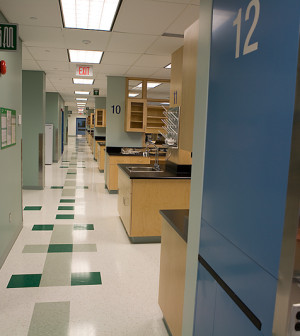- Could Your Grocery Store Meat Be Causing Recurring UTIs?
- Are You Making This Expensive Thermostat Error This Winter?
- Recognizing the Signs of Hypothyroidism
- 10 Strategies to Overcome Insomnia
- Could Artificial Sweeteners Be Aging the Brain Faster?
- Techniques for Soothing Your Nervous System
- Does the Water in Your House Smell Funny? Here’s Why
- Can a Daily Dose of Apple Cider Vinegar Actually Aid Weight Loss?
- 6 Health Beverages That Can Actually Spike Your Blood Sugar
- Treatment Options for Social Anxiety Disorder
Many May Be OK to Drive 2 Weeks After Getting New Hip: Study


Many people who’ve had hip replacement surgery might safely be able to drive as soon as two weeks after the procedure, a new small study finds.
This rapid return to getting behind the wheel is due to improvements in surgery, pain management and rehabilitation, the researchers said. Studies conducted more than a decade ago recommended that total hip replacement patients wait six to eight weeks before driving again, the researchers said.
The new study included 38 people who underwent total hip replacement between 2013 and 2014. Their brake reaction time was tested before and after their procedure.
The results showed that 87 percent of the patients regained their presurgery brake reaction times within two weeks after surgery, and the other 13 percent reached that point within four weeks after surgery.
There were no differences in terms of age, gender or the use of assistance devices, according to the study that was presented Tuesday at the annual meeting of the American Academy of Orthopaedic Surgeons (AAOS) in Las Vegas. The study was also published online November 2014 in the Journal of Arthroplasty.
“We found that brake reaction time returned to baseline or better in the vast majority of patients undergoing contemporary [total hip replacement] by two weeks following surgery,” said study author and orthopedic surgeon Dr. Victor Hugo Hernandez in an AAOS news release.
The “findings have allowed us to encourage patients to re-evaluate their driving ability as soon as two weeks after,” total hip replacement, he added.
However, Hernandez noted that the findings are based on this particular group of patients, and caution is needed in translating the results to the general population. Also, patients should never drive if they are still taking narcotic pain medications, he warned.
Each year, more than 322,000 people have hip replacement surgery in the United States, according to the AAOS.
More information
The U.S. National Institute of Arthritis and Musculoskeletal and Skin Diseases has more about hip replacement.
Source: HealthDay
Copyright © 2026 HealthDay. All rights reserved.










